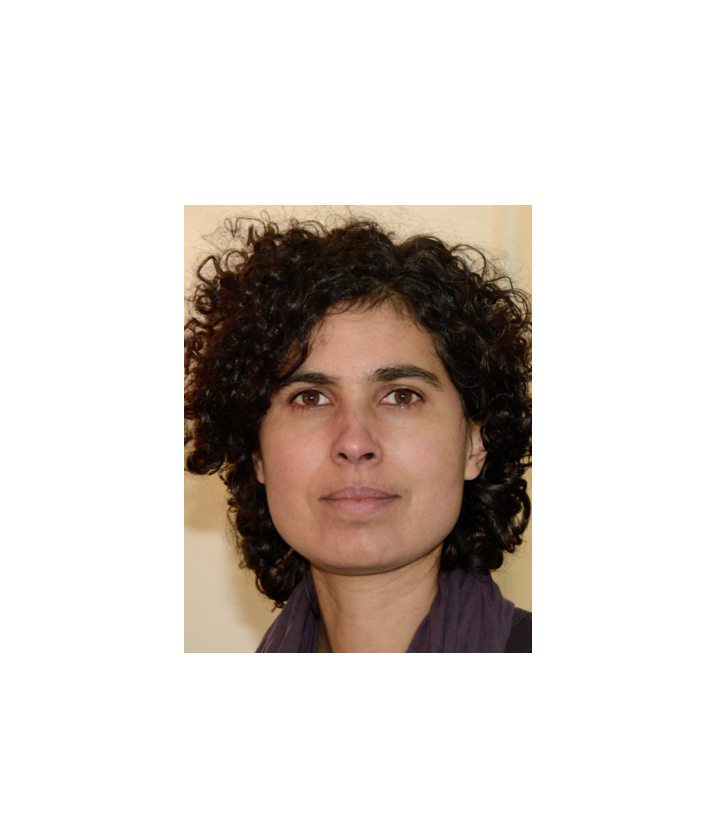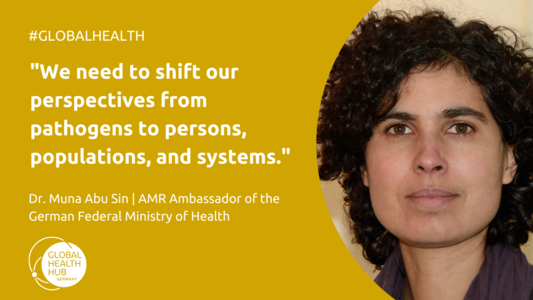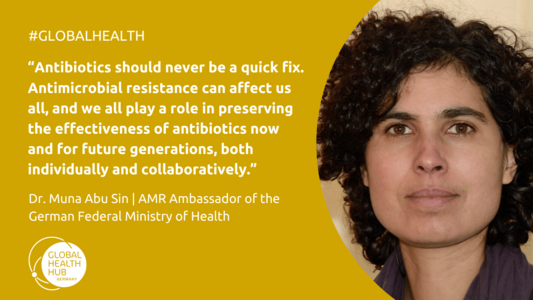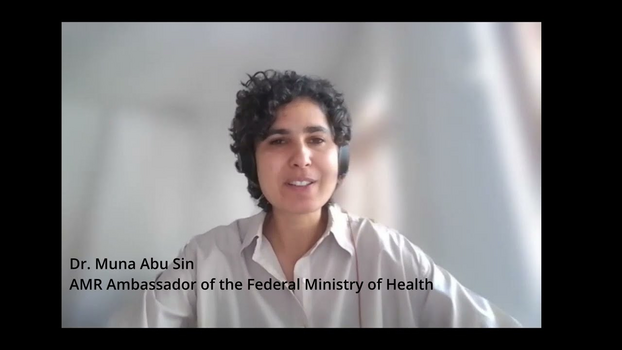In conversation with Dr. Muna Abu Sin, the first AMR Ambassador of Germany’s Federal Ministry of Health

In an exclusive interview, the Global Health Hub Germany had the opportunity to speak with Dr. Muna Abu Sin, the newly appointed AMR Ambassador of the German Federal Ministry of Health.
Antimicrobial resistance (AMR) is a critical issue that demands coordinated international action. To understand Germany's approach in tackling AMR, we interviewed Dr. Muna Abu Sin to hear her insights on the challenges and priorities in tackling AMR, her role and responsibilities, and her expectations for the upcoming UN High-level Meeting on AMR.
Germany’s Federal Ministry of Health only created your role of AMR Ambassador earlier this year. Could you please briefly explain why the role was established and describe your main tasks and responsibilities in this role.
Muna Abu Sin: The idea of the role is to support and further strengthen Germany's efforts and collaborative work against antimicrobial resistance at the international and global level. Inspiration for this role came from Sweden, which established a similar position at the Swedish Ministry of Health and Social Affairs and appointed Malin Grape in 2022. The year 2024 is marked by a series of high-level meetings on antimicrobial resistance, and I have been seconded earlier this year from the Robert Koch Institute to the Federal Ministry of Health to support the processes around these events.
During the World Health Assembly end of May in Geneva, antimicrobial resistance was an important agenda item with the resolution on accelerating national and global responses. In September, the United Nations General Assembly in New York will hold a high-level meeting on antimicrobial resistance, and in November, there will be a ministerial meeting on antimicrobial resistance in Saudi Arabia. Similar meetings were hosted in 2014 and 2019 by the Netherlands and in 2022 by Oman. Additionally, other international fora such as the G7 and G20 have put antimicrobial resistance on their agenda this year.
For me, this means dialogue, exchange, and discussions with many different stakeholders at different levels from a policy perspective, which is quite different from the work I have done previously.
In your opinion, what are the biggest challenges facing Germany and the international community in the response against AMR? Can you name the three top priorities emanating as Germany’s key focus areas?
Muna Abu Sin: Countries' priorities may differ significantly as the burden of disease and resources available vary. Nevertheless, one common challenge is our communication, language and perspective on antimicrobial resistance. The topic is complex and affects humans, animals, food production, and the environment. It is not a classical disease per se, nor a syndrome.
We need to reduce infections and strengthen our systems more broadly. And we might have confined our discussions too much within the antimicrobial community instead of communicating beyond. More recently collaborative efforts try to shift the focus more towards the need for sustainable access to essential and effective antibiotics.
Both access to antibiotics and embedding antimicrobial resistance and infection prevention and control as cross-cutting public health priorities in our health systems are examples of how our discussions can be linked to the universal health coverage agenda and sustainable development goals. It is difficult to single out one or very few priorities, but sustainable efforts are important in many areas. I would mention the implementation of national action plans on antimicrobial resistance as a top priority, but also a considerable challenge. Along with this, we need to measure progress meaningfully and set impactful targets to build and strengthen the capacity to tackle antimicrobial resistance.
The overall theme of the upcoming UN High-level Meeting in September 2024 will be “Investing in the present and securing our future together: Accelerating multi-sectoral global, regional and national actions to address Antimicrobial Resistance.” Will you attend the event and what are your expectations?
Muna Abu Sin: So, this is the second UN High-level meeting on AMR after 2016. We need to reflect on what has been achieved already since then, and also on what was not and what is different now. This forum is for increasing political engagement at the highest possible level. An analysis of previous health-related UNGA high-level meetings and respective political declarations has shown the importance of specific language that can be translated into action and stakeholders responsible for implementation.
The zero draft of the political declaration was circulated end of May, and currently negotiations are ongoing. I will attend the meeting in September, but the focus should be really on the entire process and most importantly on implementation, with the meeting serving as an important catalyst and our responsibility to move forward.

In 2015, the WHA endorsed the Global Action Plan on Antimicrobial Resistance (AMR) calling on countries to develop and implement National Action Plans (NAP) on AMR. However, for most countries, the greatest challenge is not developing a NAP but the implementation of those planned efforts. Specifically, financing remains a major issue. In your opinion, what steps are needed to address the inadequate financial support for the implementation of NAP?
Muna Abu Sin: I think challenges related to the implementation of national action plans go beyond financing and can be also linked to the complexity of antimicrobial resistance. And as important the One Health approach is, we need to acknowledge the importance of sector-specific work. Nonetheless, mobilizing domestic and international funding for implementation remains a challenge for many countries. The funding landscape for antimicrobial resistance seems fragmented and sometimes not very transparent. Countries need support to better access existing potential financial resources and funding mechanisms, and I see here a role for United Nations Organizations to play in providing more support for countries.
The German approach to AMR to date, namely as reflected in previous and current DART strategies, has taken a strong "bugs and drugs" approach, with little focus on socioeconomic and equity aspects of AMR. There is increasing recognition and evidence demonstrating the need to take better account of these aspects in research, policy and practice to address AMR, in health systems as well as agriculture, animal husbandry, and the environment. What plans does the German government have to strengthen consideration of equity, gender and other related dimensions in its work on AMR, either within Germany or as part of European or international efforts?
Muna Abu Sin: Here I would really like to refer to the COVID-19 pandemic, where we have seen how important social and environmental determinants and equity aspects are in response at both local and global level. We were just coming out of a global public health crisis, and we must apply what we learned from the COVID-19 response to the global public health threat of antimicrobial resistance. We need to shift our perspectives from pathogens to persons, populations, and systems. Social determinants, disparities in exposure to infectious diseases and antimicrobial resistance, and access to health systems and interventions must be addressed. This applies equally to non-communicable and communicable diseases.
For example, the UK has now included an outcome on health disparities and health inequalities in its recently released five-year action plan for antimicrobial resistance. In recent years, there has been research on regional differences in outpatient antibiotic prescribing patterns and antimicrobial resistance patterns, also looking at age and sex differences based on routine and surveillance data in Germany. We need to explore and make use of our surveillance data and integrate other data sources where possible to understand these aspects and the impact on antibiotic prescribing and antimicrobial resistance better, potentially implementing interventions accordingly.

Our Global Health Hub Germany consists of more than 2000 non-state actors from various sectors. One of our 12 Hub Communities specializes in the topic of AMR. What role can the Hub and its members play in tackling AMR?
Muna Abu Sin: I really enjoyed the exchange we already had, and I hope it will continue. Your network is unique, and your range of perspectives is very rich. I see an important role for you in tackling antimicrobial resistance by engaging, communicating, and sharing your perspectives, and promoting understanding of the topic and its challenges. You join the AMR community at the interface with policy and dialogue, but also with other communities within and beyond the Global Health Hub.
As an AMR Ambassador, what message would you like to convey to the German public, policymakers, and international partners regarding AMR?
Muna Abu Sin: Antibiotics should never be a quick fix. Antimicrobial resistance can affect us all, and we all play a role in preserving the effectiveness of antibiotics now and for future generations, both individually and collaboratively.
This interview was conducted by Annika Tuchelt.
Image source of the top picture: Muna Abu Sin
Interested in AMR? Please find Christian Griebenows guest article on AMR here


